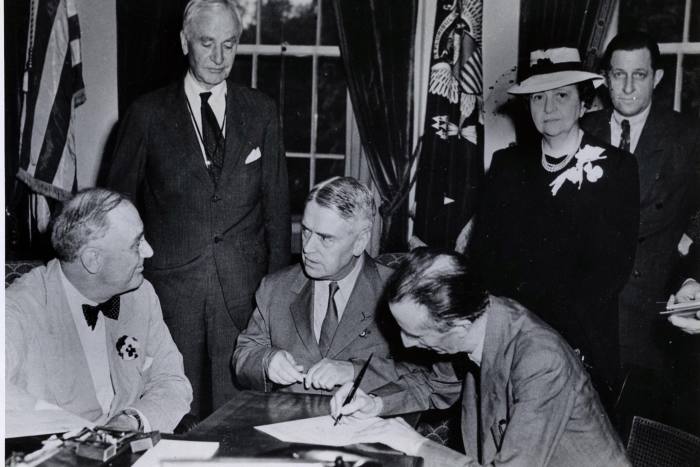
In May 1940, as the Nazis invaded the Netherlands, my mother, then 21 years old, escaped from the country in a trawler hijacked by her father, a self-made fish merchant. Her father, one of nine, asked all his wider family to join them on the journey to England. None did: they were all slaughtered in the Holocaust.
My father, who grew up in Vienna, left in 1937, at the age of 27. He then came to England, where he was living when war broke out. He was interned as an “enemy alien” in Canada. But he returned to England in 1942 and met my mother at a “welcome back” party organised by the parents of one of her friends. His immediate family survived, too. But his wider family, all of whom lived in Poland, were also slaughtered, except for one cousin, who survived by a miracle.
My father had been born in the Austro-Hungarian Empire in April 1910. Few could have then foreseen the catastrophes to befall Europe over the next 35 years. This history is not irrelevant. It must serve as a warning. It has made me aware throughout my life that political mistakes can combine with economic disasters to unleash destruction upon societies believed civilised.
Today, as in the early 20th century, we see huge shifts in global power, economic crises and the erosion of fragile democracies. But we also see the rise of anti-democratic forces in the heartland of democracy, the US. Donald Trump’s attempted reversal of the election in 2020 and the support given to his lies by his party make clear the danger.

I grew up during the cold war. The defence of liberal democracy was the political backdrop to my formative years. Subsequently, especially as an economist at the World Bank, I learnt to understand the role of market capitalism in generating the prosperity on which a stable polity depends. I welcomed the opening of the global economy and the huge contribution made by global capitalism to the reduction in mass poverty, notably in China.
Now, however, the health of democracy is in question. According to Stanford’s Larry Diamond, the world is in a “democratic recession”. How close might it be to a democratic depression, in which democracy is subverted even in states where it was long thought robust? Market capitalism, too, has lost its ability to generate widely shared rises in prosperity in many countries. In an age of populist demagoguery, “illiberal democracy”, personalised autocracy and China’s institutionalised despotism, will democratic capitalism — the marriage of liberal democracy and market capitalism — endure?
Universal suffrage democracy is only a little over a century old. Capitalism is older. But, in its modern corporate form, it is not all that much older. The system democracy and capitalism combine to create is one of social co-operation through competition and consent. Competition is at the heart of both the economy and politics. But that competition occurs within the context of rules and values internalised by society and embedded in law.
The most radical notion in democratic capitalism is that it seeks to separate political power from wealth. Power rests in the hands of the people and their elected representatives, while wealth rests in the hands of those who own economic resources and their agents.


Democracy and capitalism are complementary, in that both assume human agency, rely on the rule of law, reject ascribed status, and depend on what the economists Daron Acemoglu and James Robinson call a “shackled state”. Historically, too, democracy emerged out of the opportunities and struggles unleashed by the dynamic market economy.
Yet democracy and capitalism are also opposites. Capitalism is cosmopolitan, while democracy is tied to a territorial jurisdiction. Capitalism means one pound one vote, while democracy means one citizen one vote. One danger, then, is that wealth buys power in the name of order, turning democracy into plutocracy. Another is that demagogues seize power in the name of the people, turning democracy into autocracy.
Today’s liberal democracies are the most successful societies in human history, in terms of prosperity, freedom and the welfare of their peoples. But they are also fragile. Resting on consent, they require legitimacy. Among the most important sources of legitimacy is widely shared prosperity. A big part of the reason for the erosion of trust in elites has accordingly been a long-term relative economic decline of significant parts of the working and middle classes, worsened by economic shocks, notably the global financial crisis.
Support for populists and populist causes, such as Brexit, is driven in part by “fear of falling” — what sociologists call “status anxiety” — among people whose positions were already precarious. Not surprisingly, then, a feature of successful demagogic campaigns is nostalgia. This is why Trump’s “Make America Great Again” (my emphasis) was a brilliant slogan. It is why “Take Back Control”, the Brexit slogan, was so well targeted at people who felt they had been losing control over their livelihoods, status and even their country.


Many longer-term forces have undermined the economic and social position of the working class of the high-income democracies. Deindustrialisation, the slowdown in productivity growth, the unbalanced impact of new technologies on the demand for labour, and the end of the western monopoly of industrial knowhow were all more or less inevitable. But they were powerful.

Trump complained that “Countries are taking advantage of us . . . They’ve been doing it for many, many years, and we want to end it.” It is all too easy to blame one’s woes on deceitful outsiders, especially foreigners. Yet, despite the focus on it, international trade has had a relatively small, albeit concentrated, impact on economies. Indeed, many of the countries with the highest welfare levels have small and very open economies: Denmark is an example. The ability of capital to move freely was certainly more important than trade. More important than either was the failure to help the domestic losers from radical economic change.
A genuine problem, however, has been the rise of a rentier capitalism, in which a relatively small proportion of the population has captured rents — incomes far in excess of those needed to induce them to provide their services — from the economy and used these resources to shape the political and legal systems in their favour. A significant aspect of this has been the rising power and scale of finance, as well as a noticeable decline in competition in important parts of the economy, including the technology sector.

The financial crisis caused a big short-term economic shock and then a large loss of output relative to pre-crisis trends: in the UK, for example, GDP per head was more than 30 per cent lower in 2021 than it would have been if the pre-crisis trends had continued; in the US, it was 21 per cent lower.
Above all, the crisis and subsequent rescue of institutions believed to have caused it were unmissable indicators of elite incompetence, even malfeasance. The crisis was also followed by painful structural fiscal tightening. It was, many voters surely felt, time for a change. Why not try Trump or Brexit?
The demagogic variant of authoritarianism comes out of electoral majoritarianism taken to its limits. The leader of the government uses its power to suppress independent institutions and the opposition and then emerge as an absolute ruler, as Recep Tayyip Erdoğan, Viktor Orbán and Vladimir Putin have done.


Could this also be relevant to established liberal democracies? Certain strains of populism can enable just such a development. All populists are hostile to elites. But some are also anti-pluralist. As Princeton’s Jan-Werner Müller argues, anti-pluralist populists believe there is only one people — the “real” people — and that they and they alone represent or even embody it in their own person. This shifts smoothly into the proposition that power should be concentrated in their hands.
The energy behind populism cannot be ignored, let alone suppressed. It needs to be harnessed, instead. Politicians committed to liberal democracy must respond to the widespread distrust of elites not by surrendering to them, but by making themselves trustworthy, once again. This is what Franklin Delano Roosevelt achieved in the 1930s, by combining the innovative ideas and competence of people such as Frances Perkins, the labour secretary who laid the foundation of the US social security system, with barnstorming rhetoric against what he called “government by organised money”. Successful renewal is possible now, too.
My underlying thesis is that it is impossible to sustain a universal suffrage democracy with a market economy if the former does not appear open to the influence — and the latter does not serve the interests — of the people at large. This, in turn, demands a political response rooted not in the destructive politics of identity, but of welfare for all citizens — that is, a commitment to economic opportunity and basic security for all.
Building on FDR himself, domestic policy goals should be rising, widely shared and sustainable standards of living, good jobs for those who can work, equality of opportunity, security for those who need it and ending “special privileges” for the few.

It is possible to do better than we have been doing in all these respects. It is possible for example to limit macroeconomic instability by reducing reliance on debt-fuelled demand and making the financial system more robust. An obvious step is to eliminate the tax deductibility of interest. It is possible, too, for policy to do more to promote and spread innovation and investment. Again, it seems increasingly feasible to combine the shift to renewables with sustained economic growth, though the needed policy ambition has been lacking.
Some argue against such a pursuit of economic growth, in order to protect the climate. But “degrowth”, as this is called, is neither a necessary nor a sufficient condition for tackling the environmental problems: it is not sufficient, because it would leave emissions far too high. It is not necessary, because the best solutions are technological. Moreover, eliminating growth would not be agreed democratically. Only a tyranny could do it.
It would be a profound mistake to end economic openness: trade remains an essential contributor to prosperity for all countries, especially smaller and poorer ones, but also larger ones. Self-sufficiency is a delusion. The way to make globalisation work better politically is instead to help the places and people hit by economic change, whatever its causes.

Growth remains essential. So does the welfare state, which makes economic as well as social sense. It can insure risks the private sector will not insure. Properly designed, it can offer everybody a leg up and so promote equality of opportunity. It is an efficient way of spreading consumption across a lifetime, helping people when young (as children, students and young parents) and old (as retirees), while taxing them in their more prosperous middle years.
Some argue that universal basic income would improve the welfare state. But the additional spending would, by definition, go to those who are not the most deserving of help. It would be far better to use scarce fiscal resources on improving the welfare floor for those who need it and, even more important, subsidising employment and improving essential public services for all.
Privilege remains an issue. Perhaps the most striking example of privilege in our times has been the treatment of the members of the Sackler family who ran Purdue Pharma. They bear heavy responsibility for the mass prescription of opioids in the US, probably the worst drugs-related scandal since the UK’s opium wars on China in the 19th century. Yet, they walk free, even as 374,000 people are in prison for drugs crimes in the US. The law has to be made more even-handed. That requires a far greater separation of wealth from politics.

There are many other areas of needed reform: making competition policy more effective; making the tax system more efficient and just; and limiting corruption. We need public financing of political parties. We should be considering wealth taxes or heavier taxes on bequests, to help fund the state people will need.
Over the long run democratic competition has delivered better outcomes, in terms of prosperity and freedom, than despotism. If Xi Jinping were in a competitive election, would he maintain his absolute power? Yet we must also make democracy itself work better. One has to recognise, above all, that democracy only works if loyalty to one’s society overrides loyalty to one’s own side. In a working democracy, the legitimacy of those one disagrees with must be recognised.
We need to make our democracies stronger, too, by reinforcing civic patriotism, improving and decentralising governance, and diminishing the role of money in politics. We must make government more accountable. We must also have a media that supports democracy rather than undermines it. Only with such reforms is there hope of restoring vigorous health to democratic capitalism.
Humanity confronts many shared challenges: sustaining prosperity; managing pandemics; delivering cyber security; containing nuclear proliferation; avoiding war among great powers; and preserving the global commons.
How, then, should democratic capitalism fit into the world? Liberal democracies need to preserve the vitality of their own system, while managing their relationships with the rest of the world, in order to preserve peace, prosperity and planet.
The relationship must be one of co-operation, competition, coexistence and, where essential, calibrated confrontation. A particularly large challenge will be managing the relationship with China. But it cannot and must not be one of conflict. Nobody would gain from that. Russia’s war against Ukraine is surely catastrophe enough.
So what is to be done? First, strengthen co-operation among democracies and democratic values, including by undertaking a renewal of failing systems. Second, avoid what the political scientist Graham Allison has called the “Thucydides Trap” — the tendency for mutual suspicion between rising and established powers to generate conflict. Third, promote mutually beneficial interdependence. Finally, co-operate on shared objectives. An obvious first step is to open an intense dialogue with China on the ways forward for managed relations.
In this new world, the established democracies need to protect themselves and their values while recognising that they cannot run the world as they once did. Their share in the world’s population and economic outlook is in irreversible decline. This must be recognised.
We must recognise the fragility of democratic capitalism even in its heartlands. But we must no less recognise its enduring value. We have inherited it from the struggles of our predecessors. We must reform and protect it for our descendants. In large part, success depends on the probity and wisdom of their elites. Only if trust is revived will the legitimacy of the system be protected against its predators, who are not only without, but also, alas, within.
Martin Wolf is the FT’s chief economics commentator. His new book ‘The Crisis of Democratic Capitalism’ is published by Allen Lane on February 2







